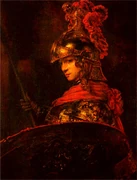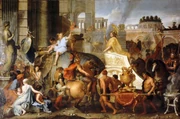| 兄弟会需要你的帮助! 本条目包含未翻译内容。您可以帮助刺客信条维基来 翻译这个条目。 |
| 这篇文章是关于King of Macedon的。关于其他用法,参见Alexander (disambiguation)。 |
Alexander III of Macedon (356 BCE – 323 BCE), commonly known as Alexander the Great, was a King of Macedonia, and one of the most successful conquerors in history.
Biography
Alexander the Great's empire was backed by proto-Templars, who had entrusted him with a Staff of Eden, explaining why Alexander was able to become so successful and undefeated.[2][3] In addition to the Staff, which reinforced his rule, Alexander wielded the Trident of Eden in battle.[4]
During his successful conquest of the Achaemenid Empire, Alexander and his Macedonians entered Egypt, freeing the land from Persian influence and being saluted as liberators by the populacy. There, Alexander also visited the Oracle of Amun in Siwa, which prophesied his exploits and hailed him as Son of Zeus.[5]
Around 330 BCE, Alexander discovered the Herat Temple, an ancient temple built by the Isu, in Herat, Afghanistan. He built the Herat Citadel atop its remains.[6]
After conquering the Achaemenid Empire, Alexander set out to take over the Punjab region of India. In the area between the Jelum and Chenab River, he encountered a prince named Porus in what would become known as the Battle of the Hydaspes.[1] Despite the Punjab force's numerical superiority, including 200 elephants, Alexander's troops flanked Porus' left side. The maneuver caused the elephants to panic, and Alexander's highly mobile cavalry proved too strong for the Punjab force.[1] Presumably impressed with Porus' military elegance and spirit, Alexander allowed him to retain his kingdom after the battle. Porus became an ally and subordinate ruler of Alexander, until sometime between 321 BCE and 315 BCE, when he was assassinated by Eudemus, one of Alexander's generals.[1]
During his reign, Alexander had created one of the largest empires in the world, and created a new Hellenistic civilization by leaving Greek colonists in his conquered lands. As he continued his conquest of Asia, a group of proto-Assassins realized that Alexander's success could not be caused by military prowess alone, suspecting that he held the Staff.[1]
Thus, in June 323 BCE, the proto-Assassin Iltani infiltrated the palace of Nebuchadnezzar II, where she poisoned Alexander.[7] On 13 June, he died of the poisoning, and his empire soon began to crumble.[1] His body was interred alongside his Staff of Eden in a tomb in Alexandria, the city in Egypt that he founded.[5] The three prongs of his Trident of Eden were split after his death amongst his generals, including Seleucus and Ptolemy.[4]
Trivia
- Historically, Alexander the Great was described to have heterochromia, a common characteristic among Sages.
- Historically, he visited the Siwa Oasis, the location of a vault that would later be opened using his Staff of Eden and an Apple of Eden.
Gallery
Appearances
- Assassin's Creed II (仅提及)
- Assassin's Creed: Revelations (仅提及)
- Assassin's Creed: Initiates (仅提及)
- Assassin's Creed Chronicles: India (仅提及)
- Assassin's Creed: Last Descendants (仅提及)
- Assassin's Creed: Origins (仅提及)
References
| ||||||||||||||||||||||||||||||||||||||||||||||||||||||||||










